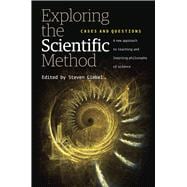
Note: Supplemental materials are not guaranteed with Rental or Used book purchases.
Purchase Benefits
What is included with this book?
| Introduction | p. ix |
| How to Use This Book | p. xiii |
| Syntactic View of Theories | p. 1 |
| Deductivism | p. 1 |
| Aristotle from Posterior Analytics and Physics | p. 5 |
| René Descartes from Discourse on Method | p. 17 |
| Case Studies | p. 30 |
| Inductivism | p. 43 |
| Francis Bacon from Novum Organum | p. 46 |
| Isaac Newton from Principia | p. 53 |
| John Stuart Mill from A System of Logic | p. 56 |
| Case Studies | p. 75 |
| Hypothetico-Deductivism | p. 91 |
| William Whewell from Novum Organum Renovatum | p. 94 |
| Rudolf Carnap ôTheoretical Procedures in Scienceö | p. 105 |
| R. B. Braithwaite from Scientific Explanation | p. 106 |
| Paradoxes of Evidence | p. 112 |
| David Hume from Enquiry | p. 116 |
| Nelson Goodman from Fact, Fiction, and Forecast | p. 127 |
| Carl G. Hempel from ôStudies in the Logic of Confirmationö | p. 131 |
| Responses to the Paradoxes of Evidence | p. 138 |
| Falsificationism | p. 141 |
| Karl Popper from The Logic of Scientific Discovery | p. 145 |
| Case Studies | p. 155 |
| Holistic View of Theories | p. 171 |
| Pierre Duhem from Aim and Structure of Physical Theory | p. 175 |
| Thomas Kuhn from The Structure of Scientific Revolutions | p. 182 |
| Imre Lakatos the Methodology of Research Programmes | p. 198 |
| Case Studies | p. 214 |
| Semantic View of Theories | p. 231 |
| Marshall Spector ôModels and Theoriesö | p. 235 |
| Max Black ôModels and Archetypesö | p. 256 |
| Ronald Giere from Explaining Science | p. 265 |
| Case Studies | p. 270 |
| Critical Views of Scientific Theories | p. 281 |
| Paul Feyerabend from Against Method | p. 285 |
| Ruth Hubbard ôScience, Facts, and Feminismö | p. 294 |
| Bruno Latour ôThe Science Wars: A Dialogueö | p. 307 |
| Case Studies | p. 315 |
| Closing Remarks | p. 325 |
| Deductivism Case Study Readings | p. 327 |
| Astronomy Aristotle, from On the Heavens | p. 327 |
| Physics Epicurus, from Letter to Herodotus | p. 330 |
| Chemistry Paracelsus, from Hermetic and Alchemical Writings | p. 332 |
| Genetics Aristotle, from On the Generation of Animals | p. 334 |
| Evolutionary Biology Aristotle, from On the Generation of Animals | p. 336 |
| Geology John Woodward, from An Essay towards a Natural History of the Earth | p. 339 |
| Psychology Hippocrates, from The Nature of Man, The Sacred Disease | p. 342 |
| Sociology Thomas Hobbes, from Leviathan | p. 344 |
| Economics Aristotle, from Politics | p. 347 |
| Inductivism Case Study Readings | p. 350 |
| Astronomy Ptolemy, from Almagest | p. 350 |
| Physics James Clerk Maxwell, from ôMoleculesö | p. 357 |
| Chemistry Robert Boyle, from The Skeptical Chymist | p. 362 |
| Genetics Gregor Mendel, from Experiments in Plant Hybridization | p. 365 |
| Evolutionary Biology Carolus Linnaeus, from Systema Naturae | p. 371 |
| Geology James Hutton, from ôSystem of the Earthö | p. 375 |
| Psychology Heinrich Weber, from ôThe Sense of Touch and the Common Feelingö | p. 378 |
| Sociology Émile Durkheim, from Suicide | p. 380 |
| Economics François Quesnay , from ôFarmersö | p. 383 |
| Bibliography | p. 389 |
| Index | p. 391 |
| Table of Contents provided by Ingram. All Rights Reserved. |
The New copy of this book will include any supplemental materials advertised. Please check the title of the book to determine if it should include any access cards, study guides, lab manuals, CDs, etc.
The Used, Rental and eBook copies of this book are not guaranteed to include any supplemental materials. Typically, only the book itself is included. This is true even if the title states it includes any access cards, study guides, lab manuals, CDs, etc.